Sleeping on a runway sounds like an adventure right out of someone's bucket list. But for thousands of people, this is their daily reality at the Tegel asylum housing center in Berlin. With plans to expand the notoriously unwelcoming facility, Germany's Der Spiegel magazine took a closer look at what goes on there, finding some shocking truths.
Berlin's Tegel airport has a fascinating past. Built in 1948, it has been witness to some of the most compelling moments in post-World War II history. Its runway made the Berlin Airlift possible when the Soviet Union blocked access to West Berlin.
During the Cold War, it became a main spot connecting West Berlin and the rest of West Germany with daily flights. And even after the Berlin Wall came down it operated for another 30 years, serving as the main gateway into Germany's reunified capital city. The hexagonal design of the main terminal was considered to be an example of iconic 20th century architecture.
In 2021, Tegel closed its doors for good, as the new BER airport opened in the southeast of the city. But before future plans for the building complex could be finalized, it continued to witness history in the making: At first it became a major vaccination center during the COVID-19 pandemic, allowing tens of thousands of Berliners to get inoculated against the deadly virus.
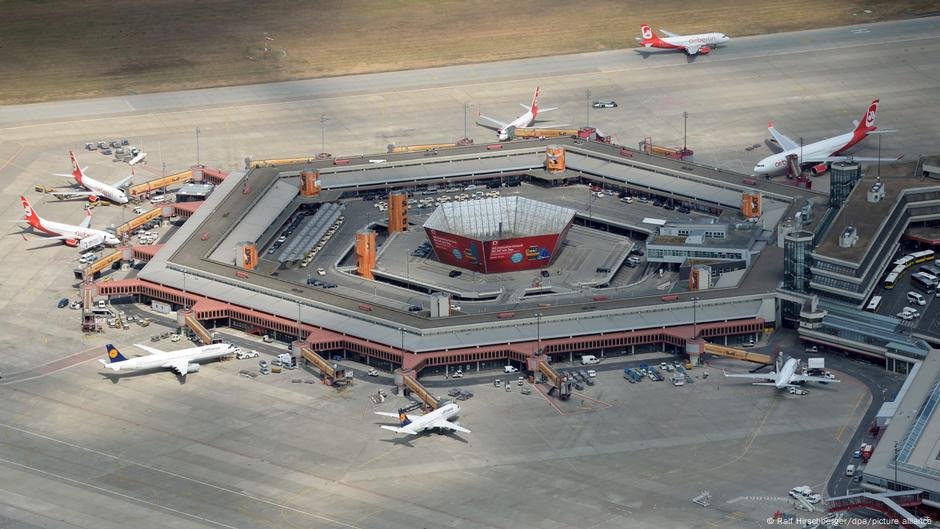
Then in 2022, it was turned into a housing facility for war refugees from Ukraine, who overnight had to pack their belongings and make their way west to escape the Russian war of aggression.
This was meant to be only a temporary measure as a first arrival center, and many of the seven million people who initially had fled the war have since returned to Ukraine or have found shelter elsewhere. It was meant to be a stopover for a couple of nights, where refugees could have a cup of tea, a warm shower, a good night's sleep and some help with sorting out the next steps they might need to take.
But over 30 months later, some of them remain in Tegel, witnessing how the former airport is currently writing what may well be its most embarrassing chapter to date.
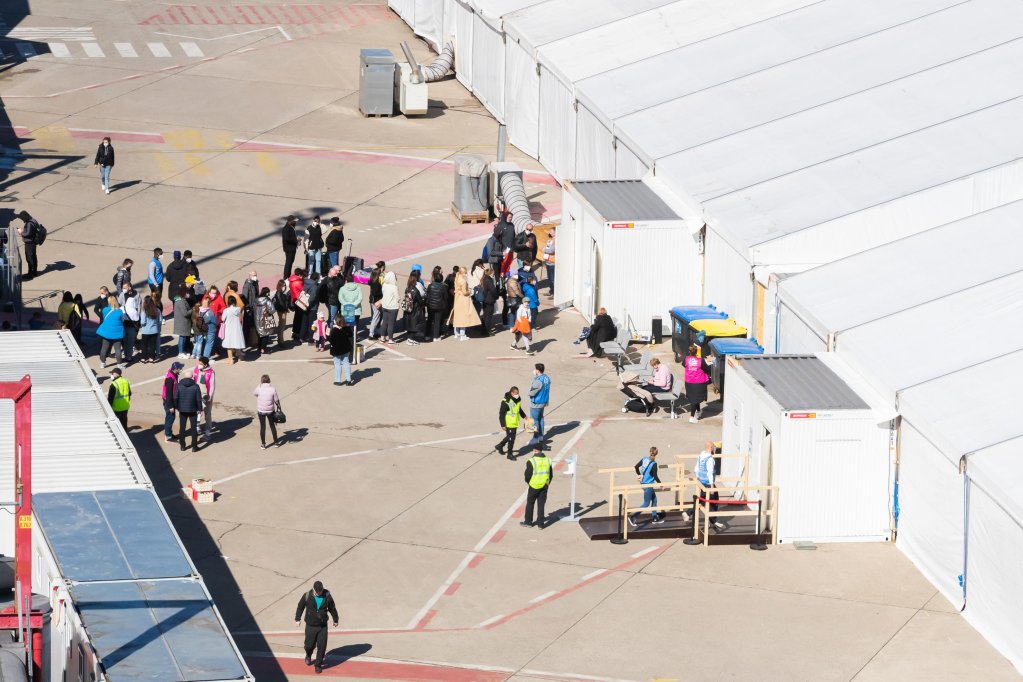
A city within a city
The German news magazine Der Spiegel spoke to more than 80 people, whose lives in one way or another are still centered around Tegel. These include asylum seekers but also people who work there.
With only one road leading in and out of the former airport terminal, it is difficult to gauge what exactly might be going on there, but according to official figures, more than 5,000 people still call the former airport building their home.
While most of them are still war refugees from Ukraine, there are also Afghans, Syrians and Iraqis waiting for their asylum decision there. There are men and women, children and elderly, as well as many people who are reported to suffer from various health issues.
Soon, there could be as many as 8,000 people housed at Tegel.
Privacy as a trade-in for anonymity
Elvira is one of the people who shared her experience with Der Spiegel. Along with her son, Radjic, the Ukrainian mother is housed in one of the many large tents on the grounds of the former airport. Hers happens to be right on the former runway.
She shares this tent with 378 other people. The sleeping quarters alone, Elvira and Radjic must share with 12 other people — some of whom they hardly know by name. Elvira highlights how there is no door to enter the sleeping area, no ceiling, no privacy. Only bunk beds. Every noise is amplified by the canopy of the giant ceiling of the tent above.
An improvised room divider is all that separates the mother and her son from the next sleeping area, where another dozen unknown names and faces share bunkbeds in the same room. But compared to the toilets, the sleeping quarters can be regarded as generously proportioned.
700 people have to share only 16 toilet stalls. Many of the showers have stopped working. There are no changing rooms.
Bunk beds at a high price
Tegel is a unique asylum facility simply on account of its sheer size. Nowhere else in Germany is there any type of similar accommodation designed to hold as many people. The running costs alone are close to half a billion euros a year, according to Der Spiegel. Depending on capacity, this could mean that housing each asylum seeker there can cost up to 250 euros a day.
Der Spiegel rightly points out that at that cost, you could get a hotel room with full board for cheaper than that. Instead, many of the families with younger children complain that their children are undernourished by the food served in the canteen.
However, all these accumulative costs aren't simply down to mismanagement or poor housekeeping. In many cases, the bottom line is the housing crisis in Berlin and beyond, which doesn't allow asylum seekers to find any affordable place to live.
Another refugee from Ukraine tells Der Spiegel that she and her husband applied with the local authorities to stay in a small flat measuring merely 19 square meters. Their request was turned down with the justification that this little space would not be sufficient for the two of them.
"Are they joking? And they don't see how I live here?" she asks.
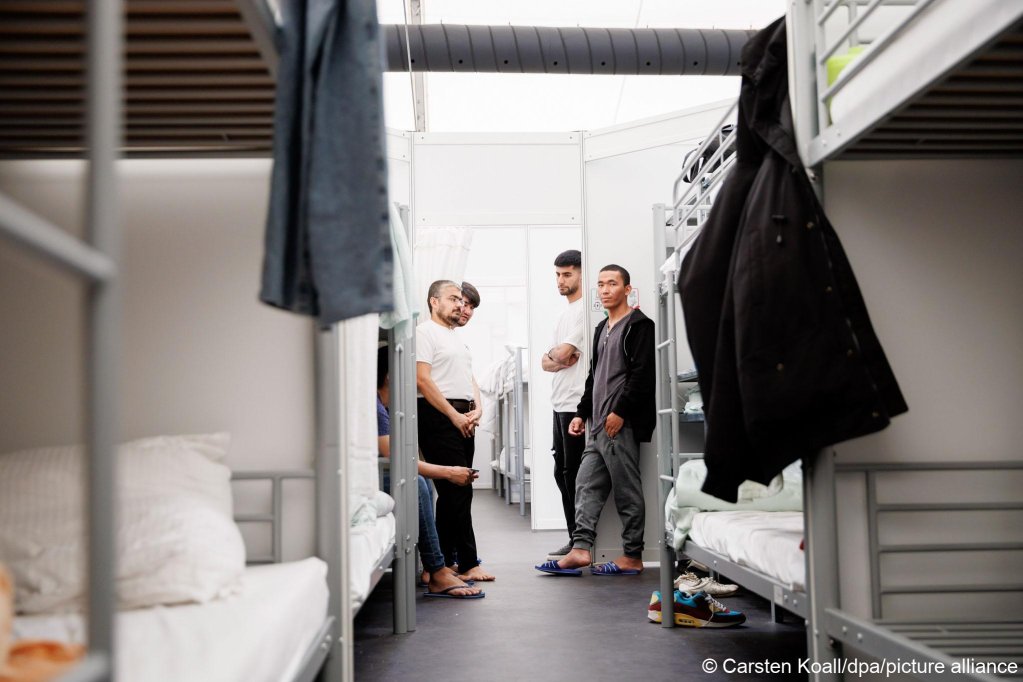
Fire drills at night
Many of the Tegel residents suffer additionally because of the regulations they have to obey. There's no food allowed -- to keep pests away. No one is allowed to even hang up a towel to create a semblance of privacy -- as this might be a fire hazard.
Around midnight, just as every last person in the 700-strong tent has stopped coughing or chatting on the phone or crying themselves to sleep -- the fire alarm goes off.
Once again, this is only a drill. In the middle of the night. Those who are traumatized from hearing sirens overhead in war zones have to relive that nightmare. No one understands why this is considered a good time to hold a fire drill for thousands of people.
"Sometimes, it just feels like a prison," says Elvira.
Massive fire in 2024
Last March, however, a fire did break out at Tegel. Amateur videos show how pure chaos ensued. Of the several hundred employees working there, no one appeared to feel compelled to grab hold of the situation. A guard outside a tent with a fire extinguisher seems unable to know figure out how exactly to use it.
Panicked people are seen running in to save their few belongings and checking whether there might be any children left behind. Some end up losing whatever little they owned to begin with: a passport, a birth certificate, a plush toy.
The clip shows how the flames consume whatever is in their way. The fact that no one dies is akin to a miracle. The cause of the fire remains unclear, even six months after the fact.
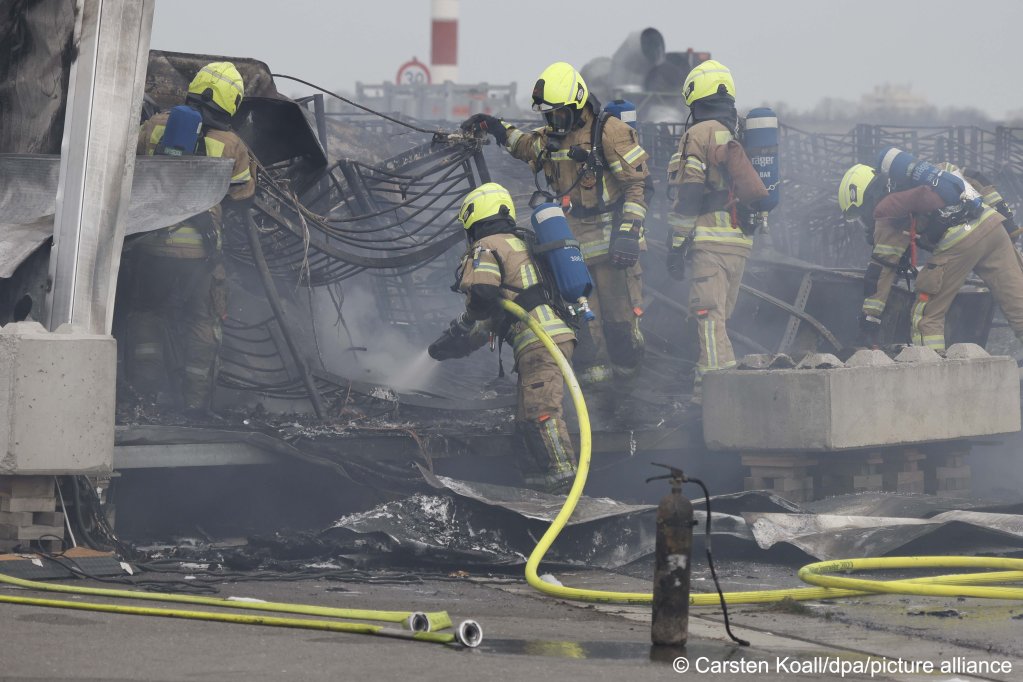
Allegations of corruption
Against this backdrop, it might be understandable that security plays such a crucial role at Tegel. In 2022, 43 million euros of the overall budget had been allocated to funding security personnel and measures. Two years on, that number has nearly doubled.
With plans to expand capacities at Tegel to host a total of 8,000 people, another 46 million euros have been allocated to safety and security, bringing the total to over 131 million euros.
One of the reasons for this explosive bill is the fact that the government has to use a variety of subcontractors to meet all security needs at the former airport. The exact costs of how much each company receives are unclear, but one of the subcontractors named Teamflex, has managed to grow its annual gains tenfold from 2020 to 2022 alone, according to Der Spiegel.
A deeper dig reveals that many of the tenders in running the airport facility were given to people who had vested interests or close connections to key decision-makers in local and regional politics.
Intimidation, racism, harassment
Corruption allegations aside, the management of safety and security at the Tegel facility has long been an issue of concern in its own right as well.
There have been numerous complaints about the security staff at Tegel, highlighting the vulnerability of the facility from multiple angles.
Some have said that the staff were racist; others have complained that there are Islamists among them. In 2023, an incident was reported in which security guards attacked Kurdish asylum seekers who had fled the brutal reign of terror of the IS regime, only to allegedly be hurled IS slogans at by some of the security personnel.
Other issues reported against the security staff are of a less political nature. Women in particular complained last year that they didn't feel safe around the male guards; that they had been harassed; that their bags had been searched by security guards as they came out of the shower, and that even their underwear had been scrutinized by security personnel in a provocative way.
Most said that there was nowhere safe for them to go, as long as they could not get a job and finally move out of the facility and into their own home.
Also read: Private security staff at Berlin refugee center accused of 'criminal exploitation'
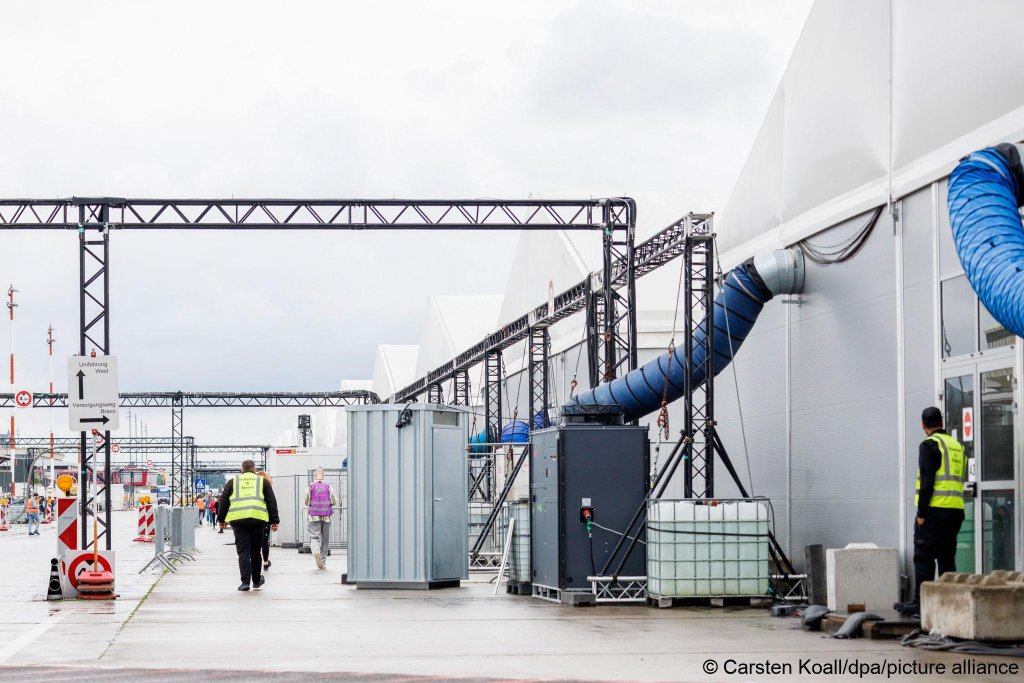
Fit to work - on paper
Many people at Tegel are in fact able to seek work and start their lives outside of the tent walls, especially Ukrainian war refugees, who enjoy certain privileges under EU law. However, the backlog of processing their cases is too long for them to simply present as a job-seeker.
Many still have to wait for months before their status is confirmed and their paperwork is handed to them. The bureaucratic hurdles are, in many instances, practically Kafkaesque.
A translator working with Ukrainian refugees told Der Spiegel that some of the social welfare offices in Berlin ask countless questions about what route refugees took, how they financed their journeys, and what passive sources of income they might have back home before they even begin to process a request.
In many cases, people lack the documentation needed to respond to any of these queries, he explained:
"They also want to see proof of appointments for the immigration office and for obtaining the residence permit, which the immigration office has yet to issue," the translator highlighted further.
"They demand things we simply cannot produce."
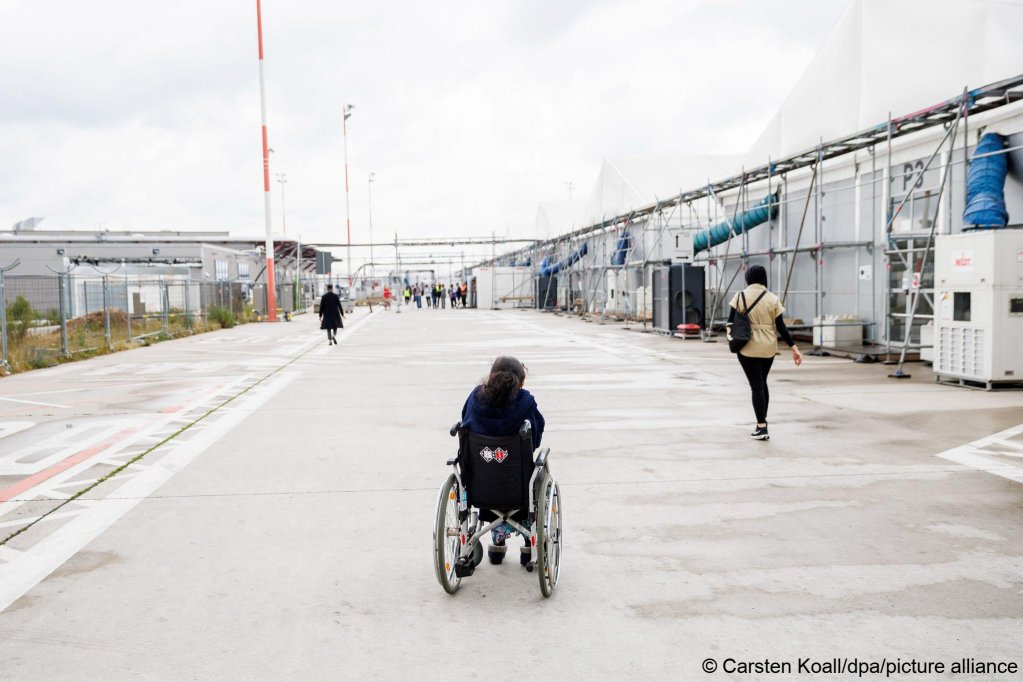
'Practically forbidden to help these people'
Der Spiegel speaks to another translator who left the job at Tegel several months ago. Whenever she thinks of her time there, she explains, she begins to cry; she says she started to work at Tegel in March 2023 with zero guidance, onboarding or advice.
"Sometimes a resident would ask me to translate a letter from the job center or the health insurance company. Then the shift supervisor would appear and tell me off for translating, for doing my job."
"In other words, we were hired to do nothing," the 40-year-old woman told Der Spiegel. "I would routinely see up to 15 employees sitting around in the tent all day, playing games on their cell phones and gossiping about the refugees.
"Hardly anyone was trained properly to work with these people. We weren't supposed to give out information, translate letters or make appointments. We were practically forbidden by the shift supervisor to help these people."
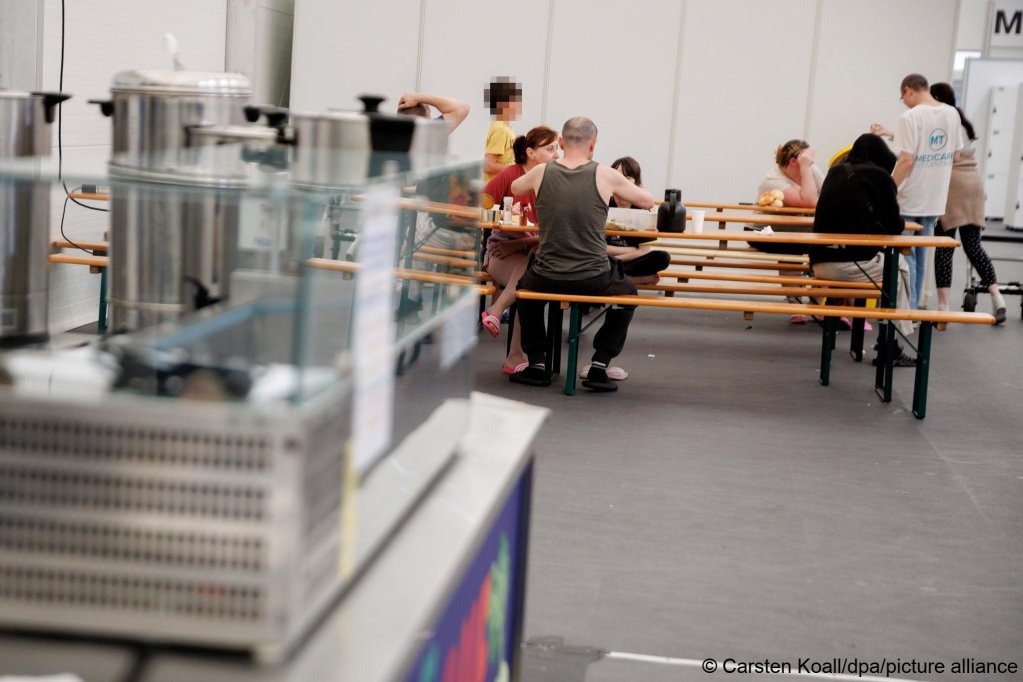
'Tegel is not a festival'
A woman named Martina Schmidt tries to explain to reporters from Der Spiegel where the origins of these organizational dysfunctions might lie. With a background in humanitarian work, Schmidt has worked for OSCE, Doctors Without Borders (MSF) and the World Health Organization (WHO) in the past.
In Spring 2022, she held a managerial role at the facility in Tegel for several months, when the center first opened. No one in management, she says, had any experience with accommodating refugees.
"They were mostly people who had been taken over from when Tegel was run as a (COVID) test and vaccination center, and these, in turn, were many people from the Berlin club scene, from the event sector, from concert management," who had lost their jobs during the pandemic, says Schmidt.
"But Tegel is not a festival."
Also read: Berlin and other German cities struggle to house refugees

Tegel's uneasy chapter continues
Set up as a temporary measure, Tegel was supposed to shrink and eventually close, according to Berlin Senator Cansel Kiziltepe, who is in charge of overseeing the portfolios of work, social affairs, equality, integration, diversity and anti-discrimination.
However her party, the Social Democrats, are in a coalition government in the city-state of Berlin with their main rival, the Christians Democrats, and their aim is to keep expanding the existing facility instead of seeking new solutions for Berlin's refugee and migrant population.
There's hardly any space for compromise between those two positions. Since hundreds of millions of euros are already being spent on existing asylum infrastructures like Tegel, convincing voters of pivoting in a new direction — at the risk of potentially even spending more — is bound to be an unpopular value proposal.
But in order to eventually close Tegel and leave its legacy for the history books, this is exactly what would need to happen: new accommodation centers would have to be built in other locations, which might be just as unused now as the former airport: office blocks, military barracks, abandoned department stores.
The truth is that in theory there is no shortage of unused real estate in Berlin especially in the post-COVID age. But it would not come for cheap, and the example of Tegel might just go to prove that wherever there is a will, the might not always be a way — unless it's a runway.
Also read: Berlin plans new mass accommodation for refugees
This article is based on the feature report "Ein Ort, den es nicht geben sollte" by Frauke Hunfeld and Alexander Kauschanski, published by Der Spiegel on September 15, 2024.
